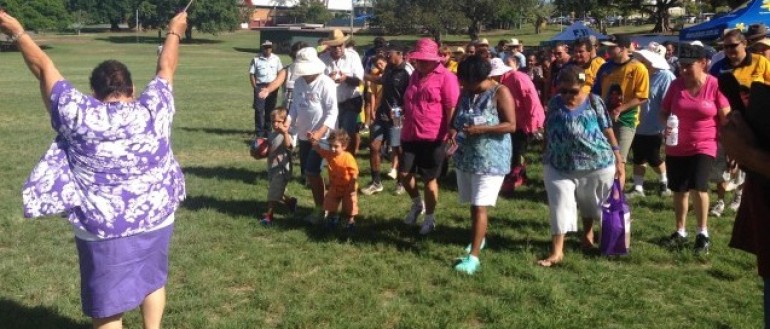The inaugural Musgrave Park Cancer Walk held in South Brisbane has been labelled a huge success, with over 200 people walking to raise cancer awareness among Aboriginal and Torres Strait Islander people.
The walk, held on 2 February 2014, brought together Aboriginal and Torres Strait Islander and non-Indigenous Australians to talk about cancer in Aboriginal and Torres Strait Islander people, treatment and care options, the importance of early detection and need for regular cancer check-ups.
The Musgrave Park Cancer Walk was held to dismiss myths surrounding cancer as a precursor to World Cancer Day on 4 February. Fittingly, this year’s World Cancer Day theme was “de-bunk the myths about cancer”.
Senior Menzies cancer researcher, Associate Professor Gail Garvey, said the strong show of public support demonstrated that key messages around cancer awareness and the need for open discussion were getting through.
“Until recently, cancer has been something we didn’t talk about, despite the disease being the second leading cause of death among Indigenous people and accounting for a greater number of deaths each year than diabetes and kidney disease,” Assoc Prof Garvey said.
“The community spirit and togetherness were clearly evident on the day, with families travelling from as far as Tweed Heads, NSW and southwest of Brisbane to attend and speak at the inaugural event.”
Over 20 Aboriginal men, women and children travelled nearly 200km from Laidley to form the Lola Brown Memorial Group in honour of their mother, aunty and grandmother, who recently passed away from cancer.
Assoc Prof Garvey reiterated the importance of good nutrition and lifestyle choices as being critical in the fight against cancer.
"We all have to eat well, eat lots of fruit and vegetables, do lots of exercise, try and give up the smokes is one of the best ways to prevent cancer,” she said.
“But if you feel something's not right, if you feel a bit of a lump or you’re coughing up some blood, go and see your Aboriginal medical service, go and talk to your GP, or go and have a conversation with a health worker about what to do next.”
“That's the best thing you can do, and go and do it early. Don't wait."
The walk was a joint initiative between the National Indigenous Cancer Network (NICaN), Menzies School of Health Research, the Aboriginal and Islander Community Health Service – Brisbane Ltd, Musgrave Park Family Fun Day, Cancer Council Queensland, QIMR Berghofer Medical Research Institute and Queensland Aboriginal and Islander Health Council.
Aboriginal leukaemia survivor, Mrs Melinda Cain from Tweed Heads, NSW, travelled to Brisbane to speak at the event about her cancer experience to “spread the word about cancer to the community.”
“I was diagnosed with leukaemia in 2012 when I was 24 weeks pregnant,” Mrs Cain said.
“It’s a hard thing getting treatment and I did it because of my family and that’s what you've got to do.”
“What I wanted to do was to speak about my sickness to show that cancer is something that we can tackle together to deal with it in our mob.”
NICaN is one of the main organisers of this event and it was established by the Menzies School of Health Research, Cancer Council Australia, the Lowitja Institute and the Indigenous HealthInfonet.
NICaN plays a major role in sharing information about cancer with researchers, communities, organisations and the families of those affected by cancer.
The second Musgrave Park Cancer Walk will be held on 1 February 2015 in the lead-up to World Cancer Day, 4 February 2015.

